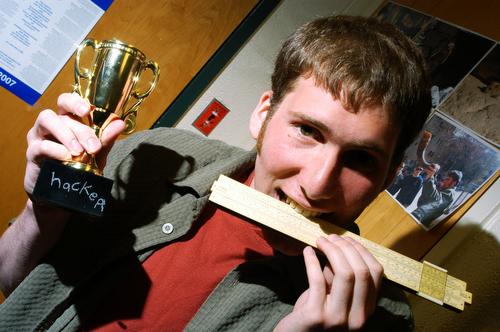Student’s widget wins award

Greg Schechter, 20-year-old sophomore in Engineering, won the Yahoo! University Hack Day challenge with a slide rule widget. “I started it just because it was really nerdy,” he said. As of press time 9,817 had downloaded the widget. For more on the compet Beck Diefenbach
Apr 9, 2007
Last updated on May 12, 2016 at 09:35 a.m.
On a warm day a student may see Greg Schechter riding his unicycle to class. Once inside the classroom you might also catch Schechter, sophomore in Engineering, using a slide rule on one of his computer science tests.
“(A slide rule) is something my mom used,” said Suraj Samaranayake, junior in Engineering.
The slide rule is a device that was invented in the 17th century and even used up through the 1950s and 60s before the invention of the calculator.
Recently, Schechter adapted the slide rule to the computer screen, and won first place with his invention of a slide rule widget at the first Yahoo! University Hack Day. A widget is another name for a computer desktop application. The competition was held at Yahoo! headquarters in Sunnyvale, Calif., on March 30.
Get The Daily Illini in your inbox!
“I think … Yahoo! liked (Greg’s project) because it’s really unique,” Samaranayake said. “(It takes) this old technology and (applies) it to a Yahoo! widget. Greg’s project had a sense of humor to it.”
When Schechter’s instructors don’t let students use calculators on a test, Schechter said he asks permission to use an alternate method.
“He’s very addicted to his slide rule,” said Viraj Kumar, one of Schechter’s instructors last fall and currently a computer science TA.
A regular slide rule looks like a ruler but is shorter in length and has six columns of numbers. One can slide a moving piece in the middle and a clear sliding piece covering the width of the slide rule to different numbers to do a variety of calculations.
Having already won the Hack Day competition on Nov. 1 when Yahoo! hosted the qualifier at the University, Schechter went on to compete against students from Stanford University, University of California at Berkley, and Carnegie Mellon University.
“For him to win at nationals was a complete long-shot,” Samaranayake said. “He was going against the best universities in the nation. Those (universities) for computer science are … as good as it gets.”
Samaranayake said Schechter is good at overcoming challenges for their Web site, called Scheedule.com, which they developed with four other students, and shows possible class schedule combinations once students enter their courses into the site.
“The algorithms that select what are valid schedules, he came up with every line (of code),” Samaranayake said. “That’s the most complicated part of the Web site.”
Schechter also came up with a map feature that shows students the buildings in which their classes are located. He has expanded Scheedule to the University of Indiana and is currently working on it for the University of Arizona.
“He kind of just jumped into it on his own and figured it all out,” Samaranayake said.
Schechter was also on his own when he created the slide rule widget and received a $2,500 check and a trophy at the competition in Sunnyvale.
The trophy is seven inches tall. Engraved on the front in child-like handwriting are the letters spelling “hacker” in an uneven, off-center arc.
Schechter said that the trophy fits the style of the Hack Day competition, where one has to throw something together really quickly. In the fall, Yahoo! gave the competitors at the University a month to create a “hack” that involved some sort of Yahoo! product, service or Application Programming Interface. Students were then given about 90 seconds to present their projects in front of judges on the big day.
“You’re just supposed to make something, whatever you can imagine,” Schechter said.
Schechter said that for the Sunnyvale competition, the judges at Yahoo! gave the competitors the opportunity to make adjustments to their projects. He said that he didn’t make any changes though because he was happy with it.
Schechter’s slide rule widget is available online at the Yahoo! Widget Gallery. His widget includes four different types of slide rules. For those who have never used a slide rule, the widget comes complete with a tutorial. Almost 10,000 people have downloaded it from the Yahoo! site so far.
This summer, Schechter will fly back out to Sunnyvale to be an intern at Yahoo!. In the future, he said that he would like to be a web developer.
“I want to be able to work on a project where I really have a lot of control (and) where I can program some of my own ideas into whatever I’m working on,” Schechter said.
Kumar, Schechter’s previous instructor, said that he hopes Schechter had gotten some of his ideas for the competition from the computer architecture course he taught.
“It’s pretty clear that he’s one of the top students in terms of being able to think things through,” Kumar said. “His clarity of thinking is actually very, very special.”





